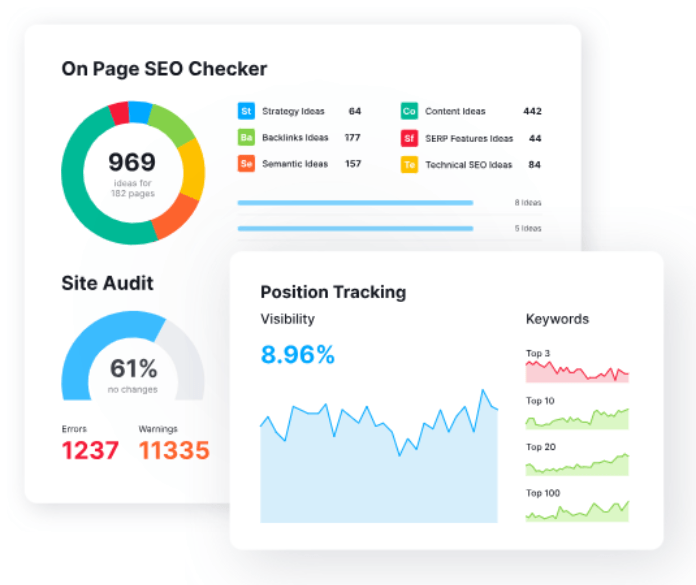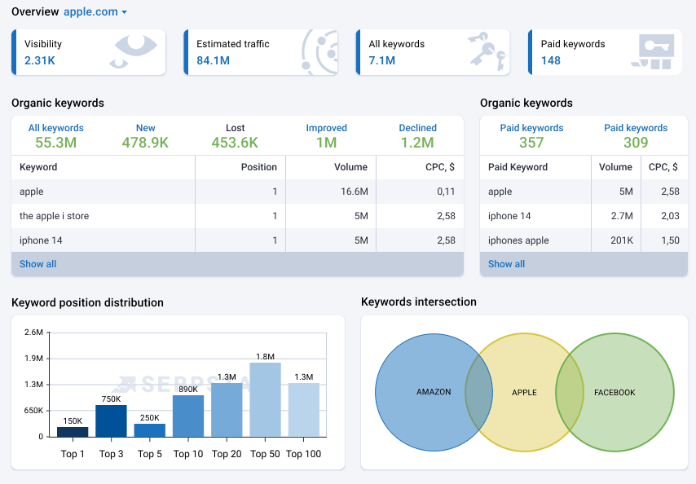When choosing keywords for your blog or website, most people turn to Google AdWords Keyword Planner. While the tool is free and easy to use, its keyword database tends to focus more on bottom-of-the-funnel search terms. Once you’re familiar with it, there are advanced alternatives that can give you more encompassing, relevant keywords.
Discover Google keyword planner alternatives and how they can help you improve your company’s keyword search strategies.
7 Google keyword planner alternatives
Explore seven of our favorite tools for keyword research!
1. Semrush

Semrush is an all-in-one search engine optimization (SEO) tool that includes a keyword research feature. The platform offers tools and data to help you enhance your online presence and marketing efforts. With options like keyword research, backlink analysis, and competitive research, you can use Semrush to optimize your online strategy and improve your site’s visibility.
Here are some of the pros of Semrush:
- Integrative suite for digital marketing, from paid advertising to SEO
- In-depth keyword research, plus competitor insights
- Keyword tracking
- Regular tool updates
- Extensive keyword database covering over 20 billion keywords
And these are the notable cons:
- Not as affordable for smaller businesses and individual webmasters
- Learning curve in understanding the various toolkits
2. Ahrefs
Ahrefs is another comprehensive SEO tool that includes a keyword research feature. It gives you insights like search volume for match types and many keyword ideas. Plus, its keyword difficulty score metric is slightly more accurate than other tools with a similar feature
Along with Ahref’s backlink reporting and organic traffic dashboards, it has a powerful Keyword Planner alternative to help you optimize your SEO strategy. Many SEO professionals and website owners appreciate the tool as a way to gain insights, improve their marketing strategies, and monitor their competition.
These are a few of the advantages:
- Custom keyword metrics
- Keyword tracking
- Keyword search volume tracking
- Extensive keyword database
- Additional SEO tools, like competitor research and audits
Ahrefs has some disadvantages, including:
- Unpopular credit-based pricing model
- Less affordable for small businesses and websites
3. Moz

In 2016, Moz launched a keyword explorer tool to supplement its SEO research suite. It offers SEO tools like keyword research, technical site audits, and daily tracking, while results show keywords, their difficulty, and potential traffic.
Filtering options allow you to exclude specific query terms to get more ideas, or search for question phrases that contain your target keyword. Businesses choose Moz’s all-in-one SEO tool set to help improve their site’s visibility, ranking, and sales.
Moz has several pros:
- Access to keyword metrics, including opportunity score
- Competitor analysis insights
- Link Explore provides backlink analysis
- Search engine results pages (SERPs) insights
- Access to an SEO software suite
Here are some of the cons of Moz:
- Higher price tag compared to other keyword search tools
4. Ubersuggest
Ubersuggest is a free keyword research tool that generates related keywords based on a quick search. You get research capabilities to identify relevant keywords for your pages, including search volume and competitive insights.
Additionally, the Chrome extension provides insightful data related to your keyword query on Google and other sites, like Amazon and YouTube.
Here are some of the benefits of Ubersuggest:
- Affordable pricing
- User-friendly platform
- Competitor analysis tools
Ubersuggest has one major drawback:
- More advanced features require a paid subscription
5. Keywordtool.io
Keywordtool.io scrapes keyword suggestions across Google, YouTube, and even Amazon to find relevant keywords. You can generate over 750 long-tail keywords for free, though you’ll need a paid plan to access search volume estimations. It even uses the Google Autocomplete feature to offer additional keyword suggestions.
The tool is a simple and more robust keyword search alternative to Google keyword planner — enter the keyword of your choice and access dozens of suggestions for any niche.
Some of the advantages include:
- User-friendly interface and affordable pricing options
- Compare Keywordtool.io results with Google Keyword Planner in a more user-friendly way
- Generate keyword suggestions across multiple search engines
A few of the disadvantages are:
- Accessing additional SEO tools can be expensive
- Does not include search volume data
6. Serpstat

Serpstat is an all-in-one SEO tool that offers over 30 SEO tools for optimizing your website, from competitor analysis tools to rank tracking, site audits, and more. If you want a budget-friendly alternative to grow your organic traffic, Serpstat is an excellent option.
With a keyword database of over 6 billion keywords, this tool can help you choose the optimal keywords for your target audience.
Serpstat’s benefits include:
- Easy to use and affordable pricing
- Detailed analytics at the URL level as well as domain level
- Responsive and helpful chat support
Some of the drawbacks include:
- No clickstream data for more accurate keyword statistics
- No keyword difficulty metric
7. Majestic
Majestic is a keyword search tool that offers link intelligence and domain metrics. Its Keyword Generator and Keyword Checkers show you how often a search term appears in their index and the search volume of that term. Access backlink histories, referring domains, and keyword search volume to improve your authority and ranking in search engines.
Here are a few of Majestic’s pros:
- Strong backlink index
- Several metrics and visualizations to analyze backlink data
- Tools to handle bulk requests
These are some of its cons:
- New pricing plans limit features, reducing value for some users
- Outdated user interface
- No integration with Google Analytics
How to choose the best Google keyword planner alternative
Among these alternatives, you’ll want to consider your budget and tools needs to choose the best one for your business. Demonstrating your top choices and getting your team’s feedback will help you select a tool to improve your SEO strategies.
If you’re looking for a free alternative to Google keyword planner, we recommend Ubersuggest or Keywordtool.io. If you’re looking to uncover hundreds of keywords within your niche, consider Semrush, Ahrefs, or Serpstat, which offer extensive keyword databases.
Choose the best keyword planner tool for your business
While Google Keyword Planner is great for beginners, you’ll find plenty of advanced alternates that generate comprehensive, relevant keywords for your business. Now that you understand these tools, it’s time to jump in and get hands-on experience!
If you’re struggling with SEO keyword research, consider our SEO services. Our award-winning team can answer any questions you might have about SEO, helping you leverage keyword planning tools for your success.
Contact us today to learn more!
Let’s Drive Results Together 
$3bn+
revenue driven for clients



Add WebFX to your content marketing toolbox today
Get SEO Proposal$3bn+
revenue driven for clients



Add WebFX to your content marketing toolbox today
Get SEO Proposal

